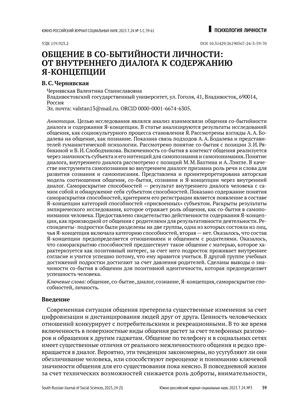Abstract
The aim of the study was to analyze the relationship between the communication of co-existence and dialog and self-concept content the content of self-concept. The article presents research results on communication as a sociocultural process of self-formation. A. A. Bodalev’s views on communication as cognition are discussed. The connection between the approaches of A. A. Bodalev and representatives of humanistic psychology is shown. The concept of co-existence from the position of Z. I. Ryabikina and V. I. Slobodchikov is examined. The inclusion of co-existence in the context of communication is realized through the significance of the subject and its intents for self-knowledge and self-understanding. The concept of dialog, internal dialog, is examined from the positions of M. M. Bakhtin and A. Langlais. The role of speech and words for the development of consciousness and self-description is recognized as a tool of self-knowledge in inner dialogue. The author’s model of the correlation between communication, co-existence, consciousness and self-concept through internal dialog is presented and interpreted. Revealing one’s abilities is the result of an internal dialog and discovering oneself as the subject of those abilities. The content of the concept of self-disclosure of abilities is shown. The criterion of its registration is the appearance of categories of abilities “appropriated” by the subject in the composition of the self-concept. The results of an empirical study that reflects the role of communication as a co-existence in human self-understanding are presented. The presented evidence suggests that the content of the self-concept that is derived from communication with parents can improve performance. The adolescent respondents were divided into two groups, one of which consisted of individuals whose self-concept included the ability category, while the other did not. It appeared that the composition of self-concept was predetermined by the relationship and communication with parents. It has been found out that self-disclosure of abilities is preceded by such communication with the mother, which is characterized as a positive interest, at the expense of which the adolescents live internal harmony and learn successfully because they like to learn. In another group, adolescents achieve academic success because of parental pressure. Conclusions are drawn about the importance of coexistence in communication for positive identity, which predetermines a person’s success.
Keywords
References
Акопов, Г.В. (2022). Новое объяснение сознания: подход М. Грациано. Психология. Журнал Высшей школы экономики, 1, 169–182. DOI: 10.17323/1813-8918-2022-1-169-182
Бахтин, М.М. (1963). Проблемы поэтики Достоевского. Москва: Советский писатель.
Бернс, Р. (1986). Развитие Я-концепции и воспитание. Москва: Прогресс.
Бодалев, А.А. (1995). Личность и общение. Москва: Международная педагогическая академия.
Бодалев, А.А. (1996). Психология общения. Москва: Издательство «Институт практической психологии»; Воронеж: НПО МОДЭК.
Бодалев, А.А. (1970). Формирование понятия о другом человеке как личности. Изд-во Ленинградского ун-та.
Брушлинский, А.В. (2003). Психология субъекта. Москва: Институт психологии, Российская академия наук.; СПб.: издат. Алетейя.
Выготский, Л.С. (2005). Психология развития человека. М.: Изд-во Смысл; Эксмо.
Знаков, В.В. (2022). Психология возможного: Новое направление исследований понимания. Москва: Институт психологии, Российская академия наук. DOI: 10.38098/prgrs_22_0447
Знаков, В.В., Рябикина, З.И. (2017). Психология человеческого бытия. Москва: Смысл.
Леонтьев, А.А. (1999). Психология общения. М.: Смысл.
Лурия, А.Р. (2020). Язык и сознание. Санкт-Петербург: Издательство: Питер.
Лэнгле, А. (2018). Что движет человеком? Экзистенциально-аналитическая теория эмоций. Москва: Генезис.
Лэнгле, А. (2018). Person. Экзистенциально-аналитическая теория личности. Москва: Генезис.
Потебня, А.А. (1999). Мысль и язык. Москва: Издательство «Лабиринт».
Роджерс, К. (1994). Взгляд на психотерапию. Становление человека. Москва: Прогресс.
Рябикина, З.И. (2020). Иной мир, иной человек, иная психология личности. В Личность и вызовы современности: интерпретация проблем различными научными школами (с. 64–69). Майкоп–Краснодар: Адыгейский государственный университет, Кубанский государственный университет.
Рябикина, З.И. (2022). НБИК-конвергенция и психологические проблемы личности в новом коммуникативном пространстве. В Общение в эпоху конвергенции технологий (с. 52–55). Москва: Психологический институт Российской академии образования.
Слободчиков, В.И. (2000). Основы психологической антропологии. Психология развития человека. М.: Школьная Пресса.
Слободчиков, В.И. (2016). Психология становления и развития человека в образовании. Вестник Санкт-Петербургского университета. Серия 16. Психология. Педагогика, 1, 100–108.
Чернявская, В.С. (ред.) (2021). Самораскрытие способностей: понятие, основные функции и условия развития. В Самораскрытие способностей как внутренний диалог: когнитивные, метакогнитивные и экзистенциальные ресурсы человека (c. 8–18). Владивосток: Владивостокский государственный университет экономики и сервиса.
Malakhova, V.R., Chernyavskaya V.S., Osadcheva I.I. (2020). Parental Attitude and Self-Diclosure of a Teenager’s Abilities. In Amurcon 2020: International Scientific Conference: Proceedings of the International Scientific Conference (pp. 619–626). Birobidzhan: European Publisher.
May, R. Angel E., Ellenberger, H.F. (1958). The Origins and Significance of the Existential Movement in Psychology. In A New Dimension in Psychiatry and Psychology (pp. 3–36). N.-Y.: Basic books.


